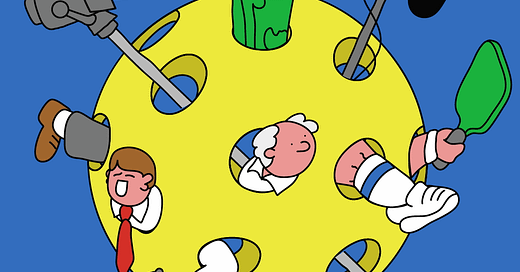There are data from over 500 studies showing that despite millions of dollars on programs to reduce racism, one of the simplest strategies remains ideal: spend quality time with someone of a different race. Psychologists refer to this as the intergroup contact effect.
It is not a new idea and yet, this is lost in diversity training programs. Just read the latest denouncement on Why DEI Training Doesn't Work—and How to Fix It (by the most famous implicit racism researcher ever).
In 1958, Gordon Allport derived his Contact Hypothesis:
To be maximally effective, contact and acquaintance programs should lead to a sense of equality in social status, should occur in ordinary purposeful pursuits, avoid artificiality, and if possible enjoy the sanction of the community in which they occur. The deeper and more genuine the association, the greater its effect. While it may help somewhat to place members of different ethnic groups side by side on a job, the gain is greater if these members regard themselves as part of a team.
Allport even included 4 conditions for contact to be effective at reducing racism, sexism, ageism, and able-ism [insert your own personal vendetta-ism]. Think about these 4 conditions as provocative questions when dissecting your workplace or neighborhood:
Does each person hold equal status in the social situation? (supportive evidence -here)
Does the group need to rely on cooperation for making progress toward desired goals? (supportive evidence -here)
Is there a common goal for these interactions? (supportive evidence -here)
Are there incentives to treat members of diverse groups in a harmonious manner (with some form of sanction/punishment for those who fail to do so)? (supportive evidence -here)
Now more recent work suggests an additional condition for bringing diverse people together, effectively. Is there an opportunity for strangers to become acquainted and even form friendships (through reciprocal, gradual self-disclosure)? (supportive evidence -here). Such intimacy opportunities allow for interactions where stereotypes can be deactivated and modified.

As blindly optimistic as it sounds, it is this framework of intergroup contact that leads people to believe that activities such as pickleball can save society.
We overvalue formal meetings, workshops, and “master classes.”
We undervalue activities that involve fun, flow, and connection. Create situations where socioeconomic differences and racial and age stratification are irrelevant.
Design strong situations that afford the ingredients for healthy intergroup contact.
Provocation
The evidence is unequivocal: the most effective strategy for combating racism, despite millions spent on diversity programs, remains refreshingly straightforward—spending quality time with individuals from different racial backgrounds. The 'intergroup contact effect' is a concept that, though not new, gets lost in the rush to push diversity training programs. Denunciations of DEI training echo the wisdom of returning to the basics of how healthy relationships, and even better friendships, are formed.
With the proper elements, interactions become fertile ground for deactivating and modifying stereotypes, ultimately fostering harmonious relationships.
So, reflecting on these insights, let yourself wonder:
Can simple acts of shared enjoyment and connection truly be catalysts for positive societal change? The evidence suggests they just might.
Don’t skip seemingly simple, mundane solutions to make money, appear intelligent, and offer an illusion of profundity.
If you enjoyed this newsletter, please leave a ❤️. Even better, share this with someone who could use a boost or buy me a whiskey shot. Even better, become a paid subscriber and help support my time and get access to private Ask Me Anything sessions by CLICKING HERE:
And if you read The Art of Insubordination, let other people know with an Amazon review or social media post.
And with the birthday of The Upside of Your Dark Side, explore some neglected ideas and implement some powerful, evidence-based strategies for being a fully actualized human. A book that Robert Biswas-Diener and I produced long before toxic positivity became a household term. It’s more relevant than ever.
………………………………………………………………………………..
Extra Curiosities
THE PODCAST EPISODE - When everyone has a megaphone, are we pouring gasoline on the dumpster fire by suggesting people should be healthy skeptics, questioning everything? Listen to this Smart People Podcast episode on how to challenge the status quo effectively.
………………………………………………………………………………..
Dr. Todd B. Kashdan is the author of 3 books and a Professor of Psychology who leads The Well-Being Laboratory at George Mason University.
Take the PRINCIPLED REBEL quiz.
Follow me on socials: Twitter or Facebook or Linkedin or Instagram





